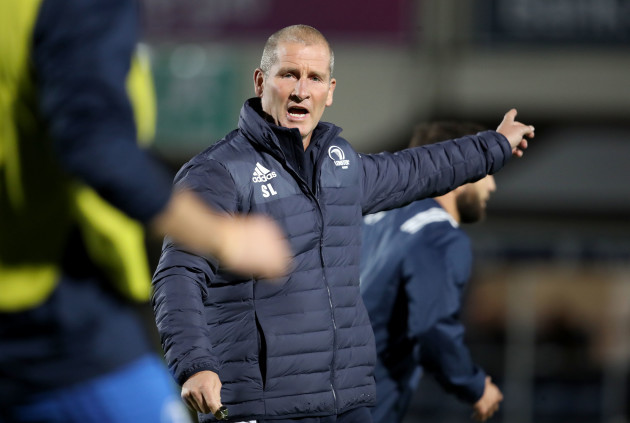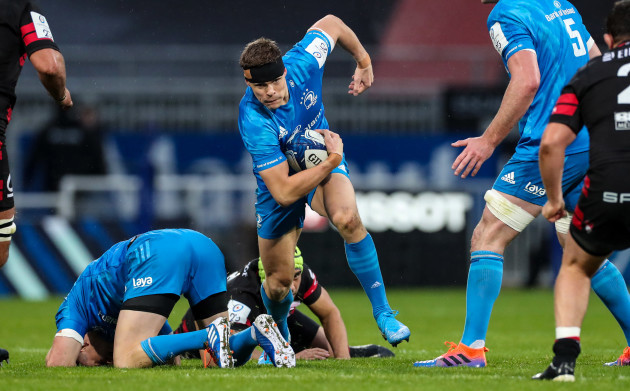LEINSTER SENIOR COACH Stuart Lancaster is a man who takes his craft very seriously, and someone who epitomises a growth mindset.
The Englishman is a big believer that both he and his players can constantly get better and learn new skills if they apply themselves diligently.
Lancaster is also often willing to share much of what he is learning and teaching, which explains why he has a podcast, Leaders Questions, that welcomes guests on to discuss various aspects of leadership.
Having strong leaders is obviously a key part of being a successful rugby team and Lancaster has recently mentioned that the Leinster changing room, and Irish rugby in general, includes many players who are introverts.
Typically of his growth mindset, Lancaster doesn’t believe that introverts cannot learn to be more comfortable in speaking up, however, and he says Leinster’s quieter players are making plenty of progress in this regard.
While established figures like Johnny Sexton have more extroverted personalities and feel very comfortable in making themselves heard, Lancaster explains that he has been working with the “next generation” in the likes of James Ryan, Garry Ringrose, Robbie Henshaw, and Luke McGrath to push them a little more.
“If you can see the growth of them in team meetings and how they own the team, that’s what the best teams have,” said Lancaster yesterday at Leinster’s team base in UCD.
“I wouldn’t have said it in the podcast if I didn’t think it was important. There are so many different personality types. What I found over here is a lot of the players are quiet, they are detail-orientated.
“They are very respectful of coaches and what they say and everything else, which is great, great qualities but equally they need to be leaders on the field. So, sometimes, you’ve got to push this person who is traditionally quite reserved and quite quiet to be more vocal in meetings, to be more vocal in training sessions, to be more vocal in games because ultimately they are the ones that drive the performance.
“The way in which you go about that, I think, is to raise firstly raise the awareness of their own personality type. Explaining there is no right or wrong and then get them to understand how to flick that personality during those key moments – games, training sessions, meetings – and more importantly, when they do make that step to voice their opinion that you support it and don’t belittle it.
“There is nothing worse than a coach saying to an introvert, ‘I want you to give an opinion’ but you immediately knock them down for giving it. In which case, they will never give it again.”
Lancaster himself feels he is more of an introvert, so he can empathise with the learning process some of Leinster’s emerging leaders are going through.
“I am probably more so. I guess as a coach you have to learn to flip between the two. It’s the same as a player. I actually showed them my personality profile first and I’d be very similar to some of them.
“You just learn to flip it from speaking in meetings and growing in confidence and that’s what we are trying to do with them. Albeit I am trying to do it for them at a younger age. I learned it at 28, 29. We are doing it with them at 22, 23.”
Leinster’s schools systems is a huge strength for the province, delivering a raft of high-quality prospects into their academy each season, having received in-depth coaching throughout their time in school.
While Lancaster believes that this is a major advantage for Leinster, he also hopes that the detailed level of coaching in schools doesn’t strip young players of any of their independence and leadership.
“The strength of the schools system in Leinster is there for everyone to see. It’s amazing what it creates in terms of the competition, the talent pool, but there’s no doubt that part of independent thinking and player ownership and leadership is by doing things on your own, not having coaches to spoon-feed you all the time.
“I’m not saying they do that in the schools system. I’ve done three sessions with all the schools coaches and I’ve talked a lot about the balance between the structured and unstructured game and how, at school level, it’s important to allow them to do that.
“Because it’s all very well and good that a player is comfortable in his schools system, but as soon as he leaves that and comes to university or comes to Leinster to play in a different system, they have to be independent and be adaptable.
“So I don’t think it’s a drawback but it’s certainly something that could be a weakness if you allowed it to be.”
Originally published at 09.12



